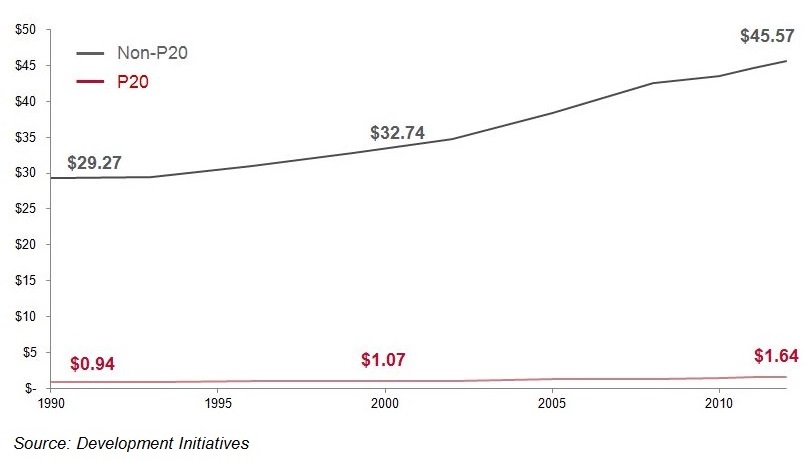Agenda 2030 and the Sustainable Development Goals have brought us a global commitment to end extreme poverty and ensure no one is left behind. For this ambition to be met, we need to know who the poorest people in the world are, understand their lives, and ensure they are included in progress. The P20 Initiative is a project focusing on the people who are in the poorest 20% globally. It aims to track their progress and improve information about their lives in order to ensure no one is left behind in efforts to tackle poverty. This briefing focuses on income.
Over the past 25 years, the average income of the P20 has doubled from $1 to $2 a day but the average income for the rest of the world has increased by $16. The gap between the people in the poorest 20% and the rest of the world is increasing as the P20 are being left behind.
Poverty is not all about income, but income is important. It gives people choice and control and is a key test of inclusion in economic growth. That’s why it is a bellwether indicator for progress for the P20.
The clear aim of Agenda 2030 is that everyone should be sharing in growth. Every year the P20 Initiative will track the average income and share of growth that goes to the P20 to monitor how it is changing and whether the P20 are being included in global growth.
- The poorest 20% of the world’s population all live on less than $2.38 per day and the average daily income is $1.64.
- The increase in wealth for the majority of the world’s population – for 80% of us – is 6 times larger than the total income of the P20.
We know that available income data is dated and gives only a partial picture of progress for the P20.
We have to use the data available to establish a baseline so that we can track progress, while also working with others to promote better data not only on incomes, but on the other elements of poverty too.
Read more about our P20 Initiative
Explore further P20 briefings on:
Civil Registration Systems and Vital Statistics
